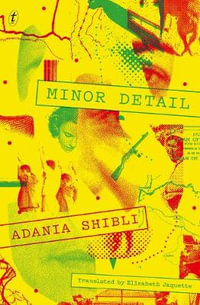*LONGLISTED FOR THE INTERNATIONAL BOOKER PRIZE 2021*
Malm, Sweden. A cellist meets a spun-out junkie. That could have been me. His mind starts to glitch between his memories and the avant-garde music he loves, and he descends into his past, hearing all over again the chaotic song of his youth. He emerges to a different sound, heading for a crash.
From sprawling housing projects to underground clubs and squat parties, Wretchedness is a blistering trip through the underbelly of Europe's cities. Powered by a furious, unpredictable beat, this is a paean to brotherhood, to those who didn't make it however hard they fought, and a visceral indictment of the poverty which took them.
Industry Reviews
'An utterly phenomenal read: a masterclass in hyper-modernist experimentation, voice and form. Embracing the bitter realities of addiction, prejudice and inner-city turmoil, Tichy's rapid prose roves internal dialogues, places, vernaculars and circumstances to expose a singular, absorbed world struggling to keep itself afloat. Through a complex network of characters, friends and strangers we're made to think about the ways the human spirit can fall into despair, its ability to establish resolve, to love and remember, and the myriad philosophies it leaves us with.' Anthony Anaxagorou----'A deeply musical book . . . and it is testament to Nichola Smalley's skill that this musicality survives translation . . . Wretchedness is sensitive and compelling.' Jon Day, Financial Times----'[The] tension between polyphony and cacophony is exhilarating . . . this furious novel's brevity is deceptive; getting through it requires stamina, but our brief stay in the cellist's mind is powerfully, nightmarishly unforgettable.' Peter Brown, The TLS----'What matters [in this novel] is how it all sounds, the clashes and stresses in the language and the energy of the surface, how it strives, ascends, descends, and trembles, like a tug-of war between weight and levity (to paraphrase a description from the book of Scelsi's Fourth String Quartet).' Caleb Klaces, The White Review----'Wretchedness is a wild intoxicant of language, momentum, and voice. Andrzej Tichy is a master of despair.' Patty Yumi Cottrell ----'Some kind of holy/unholy meeting of Thomas Bernhard and The Geto Boys, Wretchedness is an anguished, brutal, beautiful piece of phantasmagoric-realism, an act of remembrance through imagination, animated by rhythm, and pouring past you with the inevitability of the tide coming in. Brilliantly written, superbly translated, this small book packs in more sadness and moments of epiphany, more hopelessness and hope, more surviving - more life! - than most writers manage in a whole career. Remarkable.' Will Ashon ----'The past is so close behind in Nichola Smalley's translation of Tichy's precise maelstrom of memory, music and survival - on the margins of this and every city - that you can smell the chemicals on its breath. There's nothing to lose and too much to lose; no escape and all our escapes. Keep going. Read it and be thankful for Andrzej Tichy.' Tony White ----'A bravura, urgent head-trip of a novel, replete with compassion, rage, and gimlet-eyed observation on every page. Essential reading - us English-speakers are lucky to have Tichy's work available in translation at last.' Luke Kennard ----'A powerful, voice-driven novel that remains in the mind long after the final page. Tichy brings everything to life: circumstances and people we'd rather ignore, with a flow resembling music.' Derek Owusu ----'The pleasures of this book are immediate, brilliant and deeply unreasonable. Every person and every thought is intensely present. It demeans nothing.' Caleb Klaces ----'Wretchedness is a red-blooded ode to the most invisible and unwanted in society - immigrant workers, the homeless, addicts, and those born into the hardest of circumstances. Tichy's gasping, polyphonic prose flies through time and space and drug-induced states, flinging us between disturbing recollections, hopeless presents, and deferred or tainted futures - all connected by bittersour camaraderies and the remedying power of music.' Jen Calleja----'Graphic depictions of crime, racism, poverty, drug use and violence are rendered through paragraph-free slabs of text that propulsively veer between voices and minds, times and locations. As well as the Swedish estates, the novel draws on Tichy's experiences of living in Hamburg and London to paint a picture of a pan-European community of the excluded passing through squats, underground clubs, petty scams and cash-only employment. [...] Tichy's early creative life centered on music and there is a sense of musicality inherent Wretchedness.' Nicholas Wroe, Guardian ----'Visceral . . . a fascinating read, the real-life details of which further bolster the fiction . . . This is nightmarish, impressionistic literature whose disjointed sentences have an associative flow that accumulates to a shocking whole.' Sarah Gilmartin, Irish Times ----'There is a kind of unholy music in this powerful, punchy, perceptive novel.' Eithne Farry, Daily Mail ----'The polyphony of voices is tightly interwoven . . . arranged into a narrative resembling a complex musical composition . . . The book ends abruptly, as an avant-garde piece of music might, but the vibrations continue to fill the air.'Anna Aslanyan, The Guardian ----'A blurry tornado of voices and timelines, this short novel unspools over eight paragraphs of run-on sentences swirling around the memories of a cellist raised on an estate outside Malmoe . . . the novel builds to an unexpectedly heart-stopping . . . finale, with a frame-breaking time-slip that invites us to reconsider everything we've just read as a stylistically radical expression of survivor's guilt.'Anthony Cummins, Book of the Day The Observer ----'An inventive, linguistically adept experiment.' Kirkus Reviews






